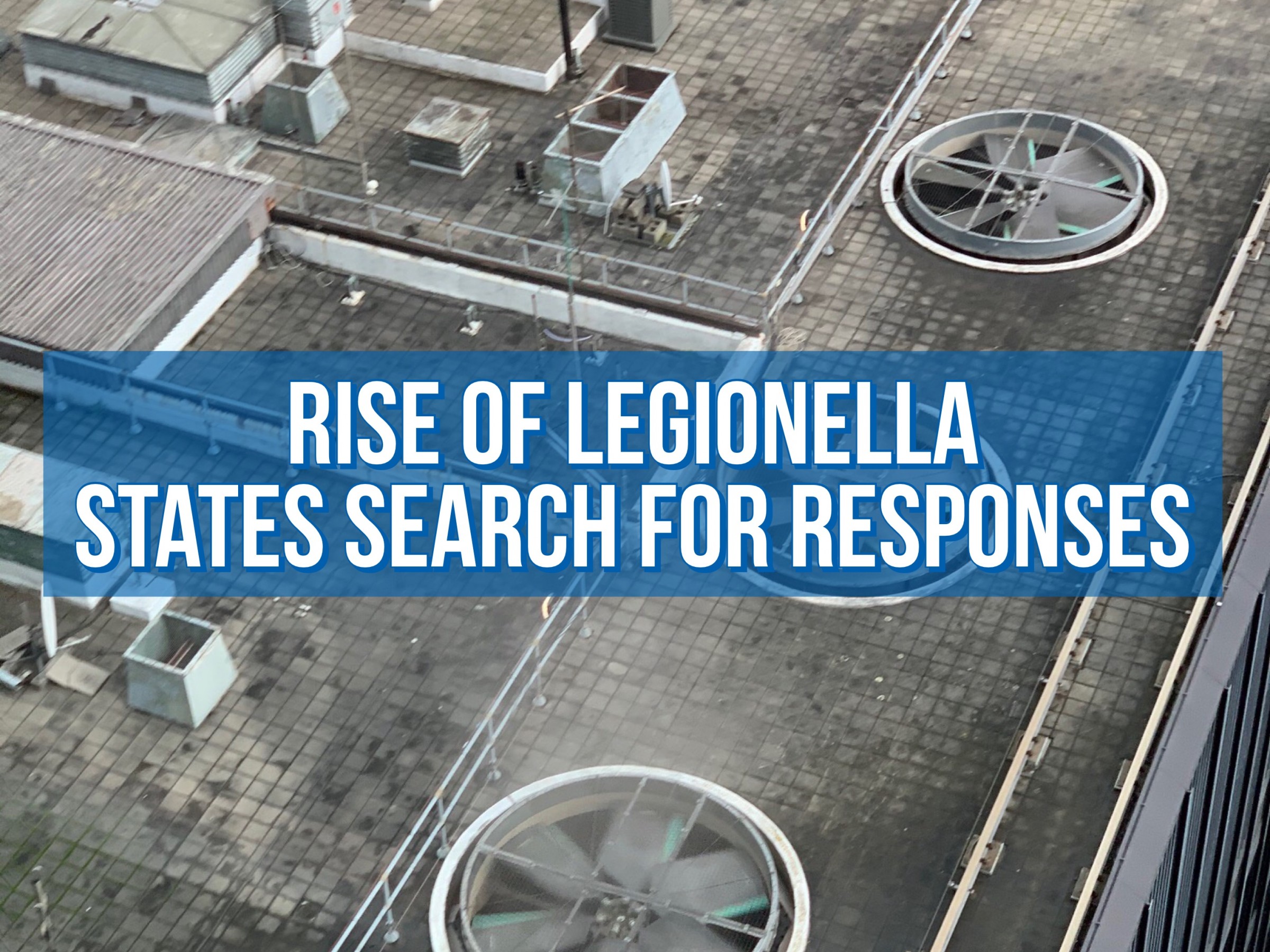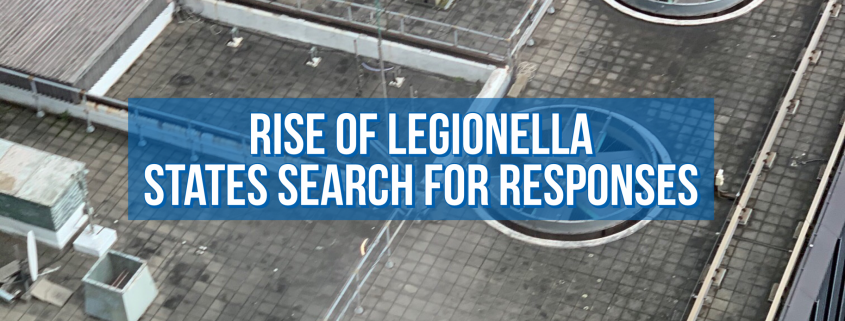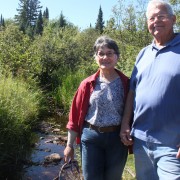Against Advice of Health Officials, Georgia Rejects Legionella Rules in New Plumbing Code
Georgia will not join the handful of jurisdictions that have rules for slowing the spread of America’s deadliest waterborne disease.

Few states have rules for preventing the spread of Legionella bacteria. Photo © J. Carl Ganter/Circle of Blue
By Brett Walton, Circle of Blue
When plumbing code revisions in Georgia go into effect on January 1, 2020, rules to prevent the growth of deadly Legionella bacteria within buildings will not be one of the new requirements.
The outcome was the result of a state plumbing code review that began in 2018 and concluded last summer.
The Department of Community Affairs, which oversaw the process, convened a committee of experts whose mission was to review changes to international plumbing codes and adopt them into the state code. The task force also considered amendments proposed by groups in Georgia.
In a meeting on January 8, 2019, the task force rejected a code amendment that would have incorporated into Georgia’s rules an industry standard for managing building water systems to prevent the growth of Legionella.
The amendment was proposed by the Georgia Department of Public Health, and it advocated for a Legionella standard that has been adopted by New York and federal healthcare agencies.
The task force was unwilling to act, at that point, because they had questions about the proper regulation of a water contaminant that most were unfamiliar with, said Pam Burnett, who was on the task force. The 11-member panel was also uncertain about how the code change would be administered and who would be responsible for enforcement, according to Burnett and others in the room when the amendment was discussed.
“To be very candid with you, since for most of us it was the first time that we had heard about it or thought about it in our own world, we just needed more time to understand the situation and the conditions — where the exposures come from and what part we might play,” Burnett told Circle of Blue. “We’re all trying to step back and learn more about it so that we can make some constructive recommendations for how to improve the amendment.”
Legionella bacteria are a rising public-health hazard. The bacteria grow in building plumbing systems and water distribution pipes. They spread in mist that is discharged from cooling towers, decorative fountains, showerheads, and hot tubs. When inhaled, they can cause Legionnaires’ disease, a pneumonia-like lung infection that is America’s deadliest waterborne illness, killing about one in 10 people infected.
Just six months after the plumbing code task force rejected the Legionella amendment a Legionnaires’ disease outbreak at an Atlanta hotel sickened dozens of people. There were 14 confirmed cases and 67 suspected cases linked to the cooling towers and water distribution system at the Sheraton Atlanta Hotel. The outbreak, the largest in Georgia’s history, killed one person.
Health Officials Argue Their Case
That deadly outbreak had yet to occur when the task force met for the first time, on November 27, 2018.
Two guest experts gave presentations that day on how Legionella bacteria grow and spread: Melissa Tobin-D’Angelo, an epidemiologist with the Georgia Department of Public Health, and Claressa Lucas, a microbiologist from the Centers for Disease Control and Prevention.
The Department of Public Health had another staff member, Maurice Redmond, on the task force. The department, however, would not allow its experts to be interviewed about the code adoption process.
“The Georgia Department of Public Health respectfully declines your request for an interview,” Nancy Nydam, a spokesperson, wrote to Circle of Blue in an email.
The department’s Legionella amendment would have required that the design of a water distribution system “include Legionella risk management measures in accordance with ASHRAE 188.”
ASHRAE 188 was developed by the American Society of Heating, Refrigerating, and Air-Conditioning Engineers, a professional society for engineers that specialize in the inner workings of buildings.
In developing the Legionella standard, ASHRAE went through a public review and comment period and gathered input from outside experts. The strict certification process was selected so that the final standard could be slipped seamlessly into local and state codes. Georgia already uses ASHRAE standards in some of its energy codes.
ASHRAE’s Legionella standard, which was finalized in 2015 and updated in 2018, provides guidance for the design, construction, maintenance, operation, and renovation of large buildings with complex water systems. That includes hospitals and high rises, as well as hotels and office complexes. A building water system encompasses all the pipes, fixtures, and equipment that move water throughout a structure.
In justifying the proposed amendment, the Department of Public Health noted the potential for saving lives and reducing healthcare costs. Though the construction cost of complex plumbing systems could increase by 10 to 15 percent due to a stricter code, remediating a building after a Legionnaires’ outbreak is also expensive, in the range of several hundred thousand dollars for a large building, according to the Department of Public Health.
There were 9,933 reported cases of Legionnaire’s diseases in the United States in 2018, according to the CDC. The number of cases has increased more than six times in the last two decades. The true number of cases, accounting for those that are misdiagnosed as pneumonia or undiagnosed, may be between 52,000 and 70,000 per year, according to the National Academies of Sciences, Engineering, and Medicine.
Task Force Deliberations
The charge statement for the task force — essentially its objective and guiding principles — notes that members, in judging amendments and revisions, should consider connections to public health and safety. But they should also be mindful of costs and financial impact.
Members of the task force were drawn from the building, plumbing, construction, and drinking water industries. They were county building inspectors and public health officials. They represented organizations like the Georgia Plumbers Trade Association, Home Builders Association of Georgia, and Association of Pool and Spa Professionals of Georgia.
Pam Burnett was the only member of the plumbing code task force willing to be interviewed. Burnett is the executive director of the Georgia Association of Water Professionals, a group that provides educational services to water utilities.
Burnett told Circle of Blue that the experience was a revelation for her.
Before serving on the task force, she had not thought much about Legionella. Neither had many of the other task force members, she said. For them, the novelty of the issue was a prominent factor in their decision not to accept the amendment.
“To sum it all up,” she said, “the plumbing code team — the people reviewing the code and the Legionella amendment proposal — felt that we didn’t understand enough about it to even know how it could be administered and enforced.”
Other task force members either did not return phone calls and email messages, or they declined to discuss the committee’s deliberations.
“Sorry, I don’t recall the conversation,” Patrick Peterson wrote to Circle of Blue in an email. Peterson, a licensed master plumber, represented the Plumbing-Heating-Cooling Contractors of Georgia on the task force.
Chris Manganiello, the water policy director for Chattahoochee Riverkeeper, attended the meeting in support of a separate amendment on water-conserving plumbing fixtures. He said that the task force members seemed concerned about who would bear the duty of implementing the code changes, who would be in charge of inspecting and certifying compliance.
Manganiello said that after the Legionnaires’ outbreak in Atlanta this summer he thought back to the task force meeting.
“I couldn’t help but think at that moment, ‘Oh, you know, eight months ago there was a plumbing code group that was basically asked these questions: What can we do to make sure we’re ready for something that happens.’ Sure enough in August it happened. My thoughts immediately went back to that task force meeting.”
Ted Miltiades is the director of the state construction codes program at the Department of Community Affairs. He attended the task force meetings, but he was not a voting member.
Miltiades said he could not remember the details of the discussion about the Legionella amendment, only that it was “thoroughly discussed.”
“I don’t recall anything specifically stated,” Miltiades told Circle of Blue. “I think they were trying to determine is it a health issue, is it a construction issue, is it both? It was the first it was brought to us.”
Other jurisdictions have grappled with the question of water management standards for Legionella. ASHRAE 188 has been adopted into codes and requirements at both the state and federal levels.
New York state ordered healthcare facilities and cooling tower operators to develop water management plans that minimize the risk of Legionella growth and transmission. Those changes went into effect in 2016, the year following a Legionnaires’ disease outbreak in New York City that killed 16 people.
The Centers for Medicare and Medicaid Services, the agency that oversees hospitals that receive federal healthcare payments adopted the standard in June 2017. In order for hospitals to retain their CMS certification — and thus be eligible for lucrative Medicare and Medicaid reimbursement — they must comply with ASHRAE 188.
Health experts recognize that building water management plans are an effective tool for preventing Legionella transmission. The CDC claims that 90 percent of Legionnaires’ outbreaks could have been prevented with a strong building water management program.
The National Academies of Sciences, Engineering, and Medicine recommended in an August report that a water management plan be required for all public buildings, including schools, apartments, government complexes, and hotels.
Next Steps
After its Legionella amendment failed, the Department of Public Health regrouped to consider next steps. The department ended up convening its own task force, in part to continue the conversation but also to explore the best fit in the state rulebook for Legionella regulations, according to Burnett and Miltiades.
The Department of Public Health would not comment on the task force.
“This work around strategies for Legionella prevention in Georgia is ongoing, and we are not at a point where we have information ready to be released,” Nydam, the department spokesperson, wrote in an email.
Burnett and Miltiades are both on the follow-up task force, and the first meeting was held in November. It consisted of more discussion about education and the root causes of Legionnaires’ disease, Burnett said. (Miltiades was not able to attend.)
Burnett said that gathering all the stakeholder organizations together has been helpful. But she could not say, at this point, what will come out of the process.
“We’re just so preliminary, so early, in a lot of this that there’s not a whole lot to say yet. We don’t know where it’s going,” Burnett said.
Brett writes about agriculture, energy, infrastructure, and the politics and economics of water in the United States. He also writes the Federal Water Tap, Circle of Blue’s weekly digest of U.S. government water news. He is the winner of two Society of Environmental Journalists reporting awards, one of the top honors in American environmental journalism: first place for explanatory reporting for a series on septic system pollution in the United States(2016) and third place for beat reporting in a small market (2014). He received the Sierra Club’s Distinguished Service Award in 2018. Brett lives in Seattle, where he hikes the mountains and bakes pies. Contact Brett Walton












Leave a Reply
Want to join the discussion?Feel free to contribute!